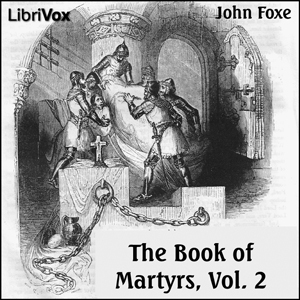
The Book of Martyrs, by John Foxe, is an English Protestant account of the persecutions of Protestants, many of whom had died for their beliefs within the decade immediately preceding its first publication. It was first published by John Day, in 1563. Lavishly illustrated with many woodcuts, it was the largest publishing project undertaken in Britain up to that time. Commonly known as, “Foxe’s Book of Martyrs”, the work’s full title begins with “Actes and Monuments of these Latter and Perillous Days, Touching Matters of the Church.” There were many subsequent editions, by Day, and by other editors down through the years. Foxe’s original work was enormous (the second edition filling two heavy folio volumes with a total of 2,300 pages, estimated to be twice as long as Edward Gibbon’s “Decline and Fall of the Roman Empire.” This edition is much abridged from Foxe’s original.
This book was first published shortly after the death of Queen Mary. During Mary’s reign, common people of Protestant Christian faith were publicly burned at the stake in an attempt to eliminate dissension from Catholic doctrines.
Foxe’s account of Mary’s reign and its martyrdoms form a significant part of the work. Foxe intended to justify the foundation of the Church of England as a continuation of the true and faithful ancient church, rather than as a new denomination.
The work has a historic perspective. It begins with early Christian martyrs, and continues with the Inquisition, Wycliffe, and the Marian Persecutions.
For the English Church, Foxe’s book remains a fundamental witness to the sufferings of faithful Christian people at the hands of the anti-Protestant Roman Catholic authorities, and to the miracle of their endurance unto death.
Roman Catholics often view Foxe’s record of this period as extremely partisan and the primary propaganda piece for English anti-Catholicism. Among other objections, the accuracy of Foxe’s claims regarding martyrdoms under Mary ignore the mingled political and religious aspects of the time period. Some of the victims may have been intent on removing Mary from the throne. Although the work is more accurate when dealing with events during Foxe’s time, it is generally not a correct or impartial account of the period, and includes occasional “willful falsification of evidence” (Summary abridged from Wikipedia by Karen Merline)

Other Audiobook
Audiobook: Discoveries Among the Ruins of Nineveh and Babylon
Austen Henry Layard is best known as the excavator of Nimrud and of Nineveh, where
Audiobook: Crome Yellow
Crome Yellow, published in 1921 was Aldous Huxley’s first novel. In it he satirizes the
Audiobook: Commentary on the Gospel of John, Book 5
Book 5 of Commentary on St John’s Gospel covers John 7:25 – 8:43. However, St
Audiobook: State of the Union Addresses by United States Presidents (1893 – 1896)
The State of the Union address is a speech presented by the President of the
Audiobook: King Lear
King Lear is widely held as the greatest of Shakespeare’s tragedies; to some, it is
Audiobook: Poppy’s Presents
One day, Poppy gets told her mother has a present for her. But the neighbors
Audiobook: Art of the Moving Picture
“This 1922 book by poet and sometime cultural critic Vachel Lindsay might have been the
Audiobook: Boy Scouts in the Rockies
Starting off their trip to the Rockies with Step-Hen getting bitten by a snake, then
Audiobook: International Harvester Refrigerator Recipes
Presented by the Home Economist of the International Harvester Company, here are six dozen recipes
Audiobook: Lion Ben of Elm Island
An adventure story for boys, in which the author aims to “impart pleasure, and, at
Audiobook: Engaged
This comedy is by Gilbert on his own without Sullivan. “Listen to me. You love
Audiobook: Essays of Francis Bacon
Voltaire was an atheist. Diderot was Enlightened. But trite titles seldom encompass completely the beliefs